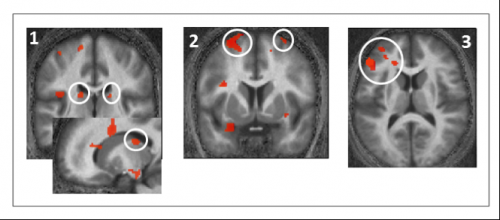March 12, 2014 weblog
Study findings suggest orange light causes people to be more alert

(Medical Xpress)—A team of researchers in Belgium has found that people exposed to orange light exhibit greater brain activity than those exposed to blue light. In their paper published in Proceedings of the National Academy of Sciences, the team describes how they studied brain activity in volunteers undergoing fMRI scanning while different colored lights were shined into their eyes and how it showed that orange light might have an impact on the circadian rhythm.
The research team was studying melanopsin—a light sensitive pigment in photoreceptor cells. Prior research has suggested that the amount of melanopsin present has an impact on the circadian rhythm of certain animals, possibly including humans. To learn more, the researchers sought out volunteers to undergo fMRI scans as lights were shined in their eyes. The idea was to find out if different light colors impacted melanopsin differently.
Each of 16 volunteers was treated to a ten minute shot of blue or orang light as their brains were being scanned. During the test, the volunteers were asked to perform a memory test, to engage the brain. Afterwards, each participant had their eyes covered for 70 minutes, to allow melanopsin to relax. They then went through the same test again, this time with green light.
In studying the brain scans, the researchers noted increased brain activity when the volunteers were exposed to orange light, but not blue light. They also found a slight increase when exposed to green light. The areas of the brain that became active, the researchers noted, were those that are believed to be related to cognitive abilities and an overall level of alertness.

The researchers speculate that melanopsin serves as a sort of switch, cueing the brain to when it's time to be more or less alert. Prior research has shown that orange light tends to make melanopsin more sensitive which appears to suggest it serves as a signal to the brain, that it's time to be more alert.
The study doesn't actually prove that orange light makes people more alert, or that it has an impact on the circadian rhythm, but it does hint at a possible link, which suggests that more research needs to be done. If both turn out to be true it could mean it might be a smart idea to install orange lighting in places where people need to be most alert (schools, operating rooms, etc.) or that those that suffer from insomnia, should never use such lamps.
More information: Photic memory for executive brain responses, PNAS, Sarah Laxhmi Chellappa, DOI: 10.1073/pnas.1320005111
Abstract
Light is a powerful stimulant for human alertness and cognition, presumably acting through a photoreception system that heavily relies on the photopigment melanopsin. In humans, evidence for melanopsin involvement in light-driven cognitive stimulation remains indirect, due to the difficulty to selectively isolate its contribution. Therefore, a role for melanopsin in human cognitive regulation remains to be established. Here, sixteen participants underwent consecutive and identical functional MRI recordings, during which they performed a simple auditory detection task and a more difficult auditory working memory task, while continuously exposed to the same test light (515 nm). We show that the impact of test light on executive brain responses depends on the wavelength of the light to which individuals were exposed prior to each recording. Test-light impact on executive responses in widespread prefrontal areas and in the pulvinar increased when the participants had been exposed to longer (589 nm), but not shorter (461 nm), wavelength light, more than 1 h before. This wavelength-dependent impact of prior light exposure is consistent with recent theories of the light-driven melanopsin dual states. Our results emphasize the critical role of light for cognitive brain responses and are, to date, the strongest evidence in favor of a cognitive role for melanopsin, which may confer a form of "photic memory" to human cognitive brain function.
© 2014 Phys.org




















